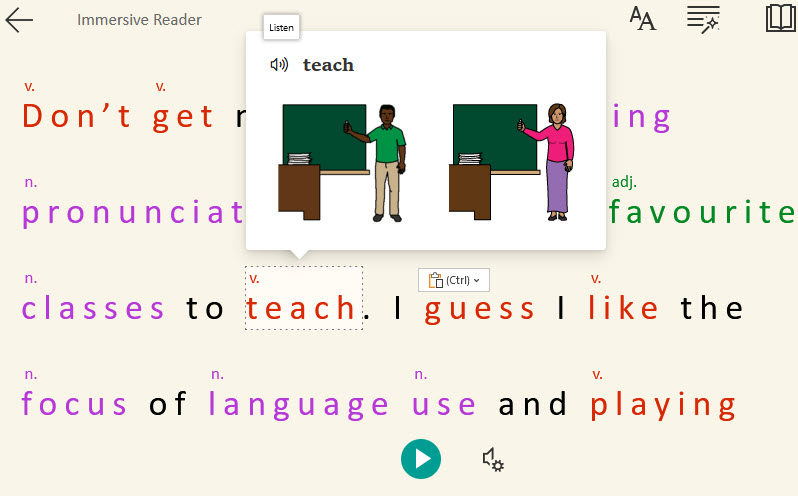Learners often come to me with questions about their English reading materials. They wonder if the books they’ve chosen are good for practicing English or why certain expressions differ from what they hear daily. For instance, one of my students asked why “you shall” was used in a text. This highlighted a common issue: many learners struggle to distinguish between reading for pleasure and reading to learn English as a second language. This leads to a vital question: How does one choose a book that benefits English learning? However, selecting the right materials involves more than just finding any English text—it requires careful consideration of the learner’s proficiency level and the regional variation of English they are exposed to.
Continue readingTag Archives: reading
Immersive Reader for Autonomous Reading Practice
Introduction
In 2018, Beth Beardall posted that reading advances learner grammar comprehension, vocabulary, writing skills, critical thinking skills and speaking fluency in the post Reading, Reading, Reading. Why it is so important! One way to assist your learners with reading is to encourage them to use the Microsoft Immersive Reader tool.
Continue readingSummary of the #English Language Skills discussion with Cecilia Aponte-de-Hanna, OCELT
Post by: Cecilia Aponte-de-Hanna and Vanessa Nino
On April 30, 2021 people in the TESL Ontario community discussed teaching the English language skills on Twitter. The guest moderator of the evening was Cecilia Aponte-de-Hanna (@capontedehanna). Cecilia is a full-time professor at Centennial College, where she teaches English communications courses to local and international students. With over 15 years of teaching experience, Cecilia has taught children as young as 3 years old to adults in their golden years.
Continue readingPut Your Reading Socks On!
A Perfect Time to Read
“Books are a uniquely portable magic,” as Stephen King wrote, so spend the rest of this pandemic with your reading socks on! It is a stressful time; reading a good book or an educational article can be extremely therapeutic!
In this blog entry, I will briefly review some professional articles and Canadian books I think you might enjoy. I would love an exchange of ideas if you read or have already read some of my suggestions listed below.
Continue readingEXTENSIVE READING RESOURCES

Since Extensive Reading (ER) is a crucial part of language learning, I have compiled some important ER resources to help you promote ER in your classroom. ER can build learners’ confidence, enjoyment and autonomy.
If you missed my first blog post, The Role of Extensive Reading in Language Learning, please read it when you get a chance so that the resources below will be most helpful.
Continue readingThe Role of Extensive Reading in Language Learning

Why is extensive reading important for language learning? And how can students be motivated to read for pleasure?
As an international student and immigrant, I know how difficult it is to read extensively in English. Diverse backgrounds and school experiences can create different profiles of reading strengths and needs. As an experienced EAP/ESL/EFL instructor, I did a case study about Extensive Reading (ER) for my MA, and I learned things I wished I had known much earlier! Now I would like to share that knowledge with other instructors because ER touches every skill we teach (Reading, Writing, Grammar, Speaking and Listening).
Continue readingCereal Box Book Report

Source: Mandeep Somal
In post-secondary, students are often required to work on culminating projects comprised of various assignments submitted at different deadlines throughout the term. My teaching partner and I wanted to bring the experience of a post-secondary culminating project into our classroom, but in a way that was both manageable and meaningful to our LINC students.
When doing major projects, my teaching partner and I are always looking for ways to optimize Portfolio-Based Language Assessment (PBLA) for all four skills (listening, speaking, reading, and writing). As we focus on teaching our students English to prepare them for post-secondary education and the workplace, we find ourselves utilizing creative ways to incorporate PBLA with scaffolded learning. Thus, we came up with the idea of a cereal box book report.
Continue readingBring Book Clubs into the Classroom

Do you belong to a book club? My mother-daughter book club is nearing its fourth anniversary! We started it as a way to encourage reading in our daughters, and four years later, not only do we have voracious young readers, but we have also built a neighbourhood community.
I started to wonder if this concept could be applied to my teaching context. I teach LINC online with LINC Home Study. I had attended a few webinars online regarding extensive reading and decided to try it out.
Continue readingSeeing Through My Students’ Eyes
 The topic for this post has been on my mind for a while. It is more of a question arising out of my experience with multi-modal text, specifically students’ work when transducing words to image. Perhaps you can help me answer the question:
The topic for this post has been on my mind for a while. It is more of a question arising out of my experience with multi-modal text, specifically students’ work when transducing words to image. Perhaps you can help me answer the question:
Whose images should students be required to produce when asked to analyze the author’s writing: The visualization of what they read or what the author intended?
I ask because I have found that controlling what students visualize while reading might be just as controversial as asking students to think in English. Continue reading
Reading, Reading, Reading. Why it’s so important!
I was talking with a colleague, Lisa, during lunch break the other day. At our school, the students have a 1-hour class with a pronunciation instructor once per week. Lisa was suggesting the merits of having a similar intensive lesson every week on reading. After our discussion, I began to consider the importance of reading versus the other skills. I am beginning to wonder if reading is the key skill to developing English proficiency.
Don’t get me wrong – Teaching pronunciation is one of my favourite classes to teach. I guess I like the focus of language use and playing with the sounds, the stress, intonation and inflection. Many students have expressed that it is important for them, as well.
Anyway, back to reading. Continue reading





